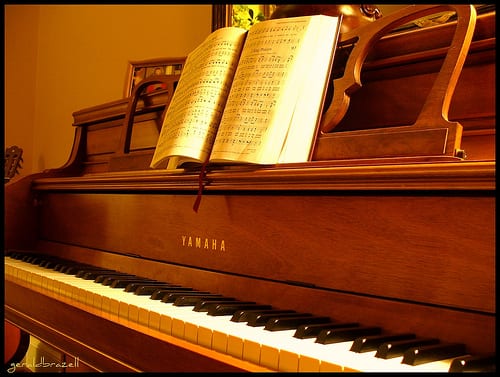 There are so many music resources online nowadays, especially for piano! Say, for example, you’re dying to learn how to play fun.’s “We Are Young” . Look up the tune on YouTube, and it might not take you long to learn the chords just by studying a player’s hands in a video.
There are so many music resources online nowadays, especially for piano! Say, for example, you’re dying to learn how to play fun.’s “We Are Young” . Look up the tune on YouTube, and it might not take you long to learn the chords just by studying a player’s hands in a video.
But if you really want to get ahead in your piano playing, you’ll need the expertise of a piano teacher and the accountability of private lessons. You can spend hours at your piano practicing on your own, but you’ll be missing out on one crucial element: feedback. Even if you’re just learning to play for fun, the extra attention from a private teacher can do wonders for your playing.
Here are some examples of common mistakes that beginners might not recognize, but that can be fixed with the help of a private teacher:
1. Wrong sitting position: too much torso swinging, curved back, raised shoulders, wrong stool height, wrong feet position, etc.
Correct body posture, and also where your piano bench is placed and where you’re sitting on it, can have a dramatic effect on your playing. Correcting any bad posture habits can also reduce the risk of injuries or stress.
2. Wrong hand position: collapsing knuckles, collapsing finger phalanxes, wrong high position of the wrist, etc.
The placement of your hands, wrists, arms and elbows is also important. If playing with unnecessary tension becomes a habit, your teacher can help you by pointing out when it happens.
3. Unnecessary finger movements: over lifting of fingers. Unnecessary arm, hand, wrist and elbow movements.
As you master correct posture and positioning, you’ll also want to steer clear of unnecessary movements. Proper piano playing requires coordination of everything combined.
4. Fingers are not strong and firm, but soft, weak and hollow.
As you play more often, you’ll need to strengthen your fingers, especially as you move onto more difficult pieces. See also: Piano Exercises for Finger Strength.
5. Music doesn’t flow from pianist’s heart and soul as it usually does in singing, but simply comes to running fingers over necessary keys on the keyboard.
Most beginner pianists are just focused on getting the notes right. As you progress, you can begin working on more advanced techniques such as dynamics and articulations, where you can really showcase your passion and emotions.
(See other common mistakes and continue reading the article at Pianowell.com.)
Once you’ve mastered the basics, you’ll have established the right foundation to then move into things like theory, form, phrasing, and other musical aspects that online videos have trouble getting across. Yes, it’s a lot to learn and lot to think about. But with the help of a great teacher, you’ll have fun in the process and you’ll reach your goals in no time!
Readers: Have you found that private lessons have helped your piano player? Stop by our Facebook page and let us know! Like these posts? Sign up to receive updates right to your inbox! Click here to subscribe.
You might also like…
– How to Practice the Piano… Outside of the Studio
– 5 Excuses for Not Practicing – And How to Overcome Them
– How to Tune Into the Perfect Music Teacher for You
Suzy S.
